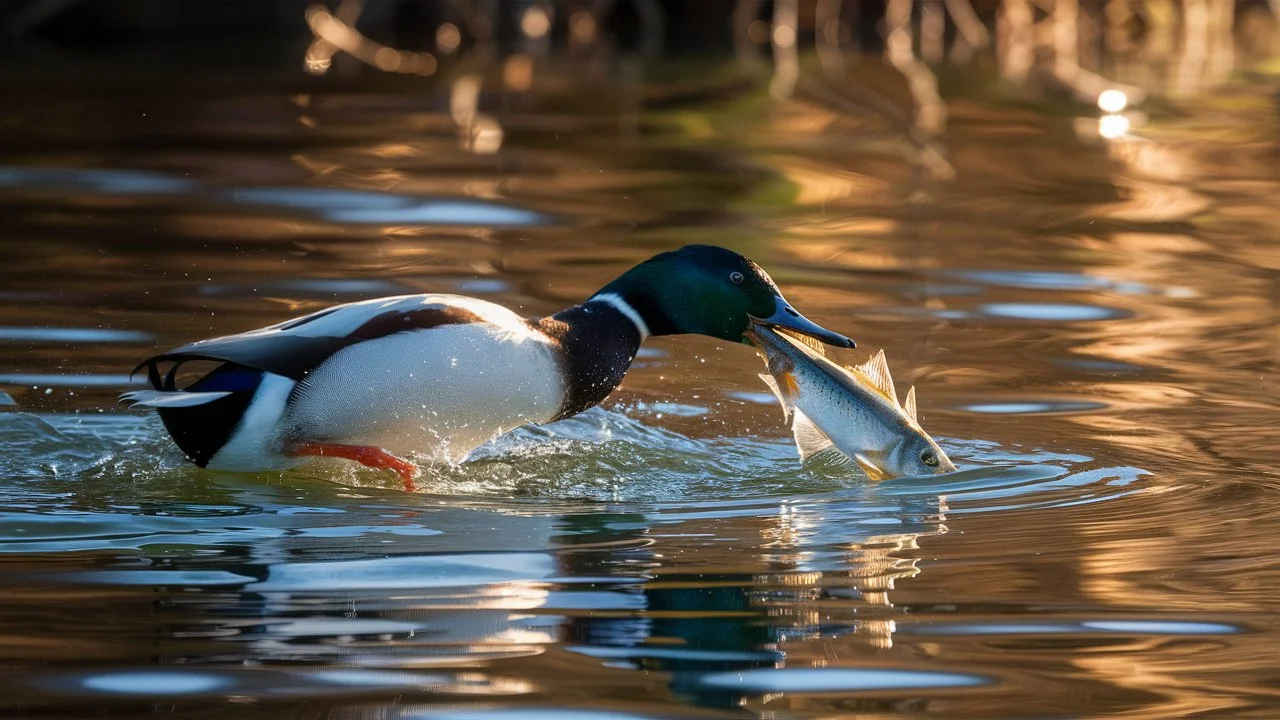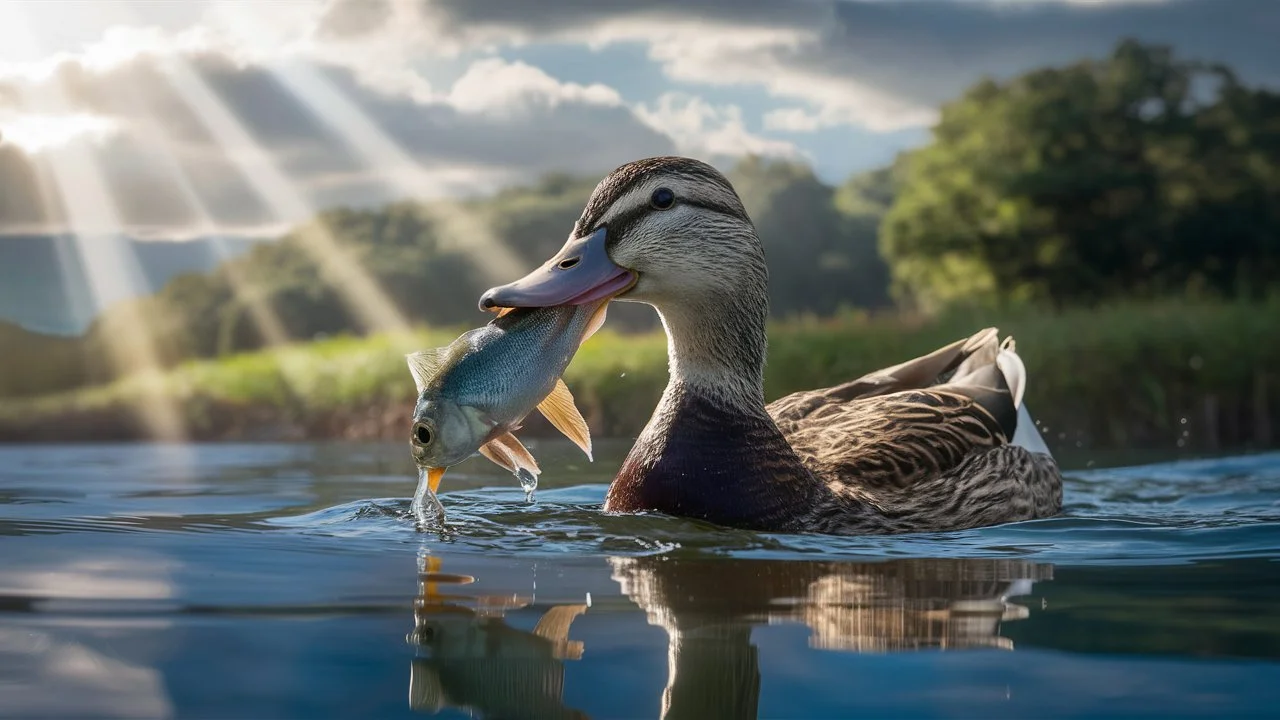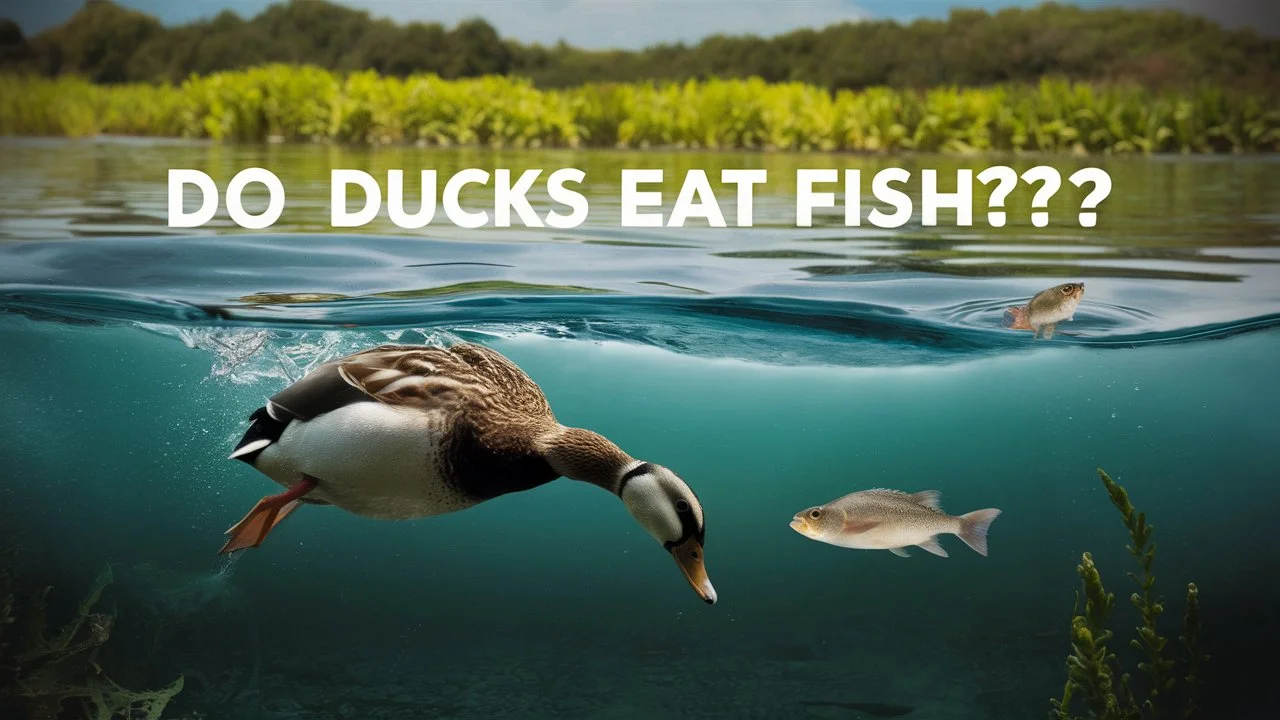Ducks are interesting creatures with diverse diets. If you’ve ever wondered whether ducks eat fish, the answer is yes. Ducks are omnivores, meaning they eat both plants and animals. While their diet mainly consists of plants, seeds, and small aquatic animals, some species of ducks do eat fish. This can vary depending on the type of duck and its habitat. In this article, we will explore the different types of ducks and their eating habits, focusing on how and why some ducks include fish in their diet.
Yes, ducks do eat fish. While they primarily eat plants, seeds, and small aquatic animals, some species of ducks also eat fish as part of their diet. This depends on the type of duck and its habitat. Ducks such as mergansers are known for eating fish regularly. Ducks will catch and eat small fish they find in ponds, lakes, and rivers.
Table of Contents
ToggleDo Ducks Eat Fish?
Ducks are fascinating birds with diverse diets. They are omnivores, meaning they eat both plants and animals. One common question people have is whether ducks eat fish. The answer is yes, some ducks do eat fish. Let’s explore this in more detail.
Types of Ducks That Eat Fish
Not all ducks eat fish, but some species do. Here are a few examples:
- Mergansers: These ducks are well-known for their fish-eating habits. They have serrated edges on their beaks to help them catch and hold onto slippery fish.
- Pochards: These diving ducks often eat fish along with other aquatic animals.
- Goldeneyes: Another type of diving duck, goldeneyes, also include fish in their diet.
How Ducks Catch Fish
Ducks that eat fish typically have specific adaptations that help them catch their prey:
- Diving: Ducks like mergansers and pochards dive underwater to catch fish.
- Sharp Beaks: Some fish-eating ducks have sharp or serrated beaks that help them grasp and hold onto fish.
- Keen Eyesight: These ducks have good eyesight to spot fish underwater.
Why Ducks Eat Fish
Ducks eat fish for several reasons:
- Nutrition: Fish are a good source of protein and other nutrients that help ducks stay healthy.
- Availability: In habitats where fish are abundant, ducks take advantage of this food source.
- Diverse Diet: Eating a variety of foods helps ducks meet their nutritional needs.
Related reading: Can Ducks Eat Chocolate?

What Time Do Ducks Eat Fish?
Ducks are interesting animals that live in many places, like lakes, rivers, and ponds. They have different eating habits, and one of the things they eat is fish. Let’s find out when ducks usually eat fish.
Morning Time
In the morning, ducks start their day by looking for food. They are active and like to find small fish to eat. The morning is a good time for ducks because the water is calm, and it’s easier for them to see and catch fish.
Afternoon Time
During the afternoon, ducks continue to hunt for food. They swim around and look for fish in the water. The sun is high, and there is plenty of light, making it easier for ducks to spot fish. Ducks may take short breaks, but they will still look for fish when they are hungry.
Evening Time
As the day ends, ducks become busy again. In the evening, they try to eat as much as they can before it gets dark. The water might be a bit cooler, but ducks are good at catching fish even in these conditions. They need to eat enough to have energy for the night.
Night Time
At night, ducks usually rest and sleep. They do not eat fish in the dark because it is hard for them to see. Ducks prefer to eat fish during the day when they can see well. If they are very hungry, they might try to catch fish in the early morning or late evening when there is some light.
Do Ducks Eat Fish in the Winter?
Ducks are adaptable birds that can live in various environments, including during the cold winter months. Their eating habits can change with the seasons. Let’s explore if ducks eat fish in the winter and how they manage to find food.
Winter Challenges
In winter, many ponds, lakes, and rivers can freeze over, making it difficult for ducks to find fish. The ice prevents them from diving into the water and catching fish. However, ducks are resourceful and have other ways to survive.
Finding Open Water
Ducks look for places where the water is not frozen. These can be areas with fast-moving water, like rivers or streams, or spots with natural springs that stay unfrozen. In these areas, ducks can still find fish to eat. They will swim and dive in these open waters to catch fish.
Alternative Foods
When fish are hard to find, ducks eat other types of food. They may look for:
- Plants: Ducks can find aquatic plants and algae, even in winter.
- Insects: They may eat small insects that are still active.
- Seeds and Grains: Ducks often eat seeds and grains that they find on the ground or in shallow water.
Adaptation and Survival
Ducks are good at adapting to their environment. In winter, they change their diet to survive. While they do eat fish if they can find them, they also rely on other foods. This ability to adapt helps ducks live through the cold months.

Do Ducks Eat Fish in the Summer?
Ducks are versatile birds that adapt their diet according to the season. Summer is a time when ducks have plenty of food options available. Let’s explore whether ducks eat fish during the summer and how their diet might change.
Warm Weather and Abundant Food
In the summer, the weather is warm, and there is plenty of food available in lakes, ponds, rivers, and streams. The water is not frozen, so ducks have easy access to a variety of foods, including fish.
Summer Eating Habits
During the summer, ducks have a diverse diet. They eat:
- Fish: Ducks love to eat small fish. They dive into the water and catch them with their beaks. Fish provide ducks with important nutrients.
- Insects: Summer is a time when many insects are active. Ducks enjoy eating bugs like beetles, flies, and larvae.
- Plants: Aquatic plants grow well in the warm weather. Ducks eat leaves, stems, and seeds from these plants.
- Crustaceans: Small creatures like crayfish and shrimp are also part of a duck’s diet in the summer.
Active Days
In summer, ducks are very active. They spend a lot of time swimming and looking for food. The long days provide them with plenty of daylight to hunt and eat. Ducks are often seen diving and foraging in the water during this season.
Feeding Habits
- Morning: Ducks start their day early, looking for fish and other foods in the cool morning hours.
- Afternoon: They continue to eat throughout the day, taking advantage of the abundance of food.
- Evening: As the day ends, ducks have one last feeding session before settling down for the night.
Do Pekin Ducks Eat Fish?
Pekin ducks are a popular breed known for their white feathers and friendly nature. They are often kept as pets or for their meat and eggs. Let’s explore whether Pekin ducks eat fish and what their typical diet includes.
Natural Diet of Pekin Ducks
Pekin ducks, like other ducks, have a varied diet. They are omnivores, which means they eat both plants and animals. In the wild or in a free-range setting, Pekin ducks may eat:
- Insects: They enjoy bugs like beetles, flies, and larvae.
- Plants: They eat grass, weeds, and aquatic plants.
- Grains: Ducks love grains such as corn, wheat, and rice.
Fish in Their Diet
While Pekin ducks do eat fish, it is not a major part of their diet. They prefer small fish and are more likely to eat fish if they have access to ponds, lakes, or streams. In a controlled environment, such as a backyard pond or farm, they might catch and eat small fish if available.
Feeding Pekin Ducks
When raising Pekin ducks, their diet is usually managed to ensure they get all the nutrients they need. Common foods for Pekin ducks include:
- Commercial Duck Feed: Specially formulated to provide balanced nutrition.
- Vegetables: Leafy greens, peas, and other vegetables are healthy treats.
- Fruits: Ducks enjoy fruits like berries and apples in small amounts.
- Protein Supplements: Mealworms or small amounts of fish can be added for extra protein.
Foraging Behavior
Pekin ducks enjoy foraging and will eat small fish if they come across them while exploring their environment. They use their bills to dig and search for food in the water and on land.
Do Mallard Ducks Eat Fish?
Mallard ducks are one of the most common and recognizable duck species in the world. They are adaptable and have a varied diet. Let’s explore whether mallard ducks eat fish and what their typical diet looks like.
Natural Diet of Mallard Ducks
Mallard ducks are omnivores, meaning they eat a wide range of foods from both plant and animal sources. Their diet includes:
- Plants: Mallards eat a variety of aquatic plants, grasses, and seeds.
- Insects: They consume insects, such as beetles, flies, and larvae.
- Crustaceans: Small crustaceans like crayfish are also part of their diet.
- Fish: Yes, mallard ducks do eat fish, though it is not the main part of their diet.
Fish in Their Diet
While fish is not the primary food source for mallard ducks, they do eat small fish, especially when other food sources are less available. Mallards catch small fish by dabbling in shallow water or diving slightly underwater. They use their bills to scoop up fish along with other food items.
Feeding Behavior
Mallard ducks have flexible feeding behaviors that allow them to thrive in different environments:
- Dabbling: Mallards often tip forward in the water to reach plants and small animals just below the surface.
- Foraging: They forage along the edges of ponds, lakes, and rivers, looking for insects, plants, and small aquatic creatures.
- Diving: While not as deep divers as some other duck species, mallards will dive to catch fish and other small prey if necessary.
Seasonal Diet Changes
The diet of mallard ducks can change with the seasons:
- Spring and Summer: Mallards have access to a wider variety of foods, including insects, plants, and small fish.
- Fall and Winter: As the weather gets colder, mallards may rely more on seeds, grains, and any available aquatic vegetation. Fish can still be part of their diet if they can find them in unfrozen water.
Conclusion:
Ducks are omnivores with diverse diets that include plants, insects, crustaceans, and small fish. While not all ducks rely heavily on fish, many species, like mallards, do eat fish when available, especially in warmer months with unfrozen water. Their feeding behaviors, such as dabbling and foraging, help them catch fish and adapt to seasonal changes. Overall, ducks’ flexible diets allow them to thrive in various environments.

